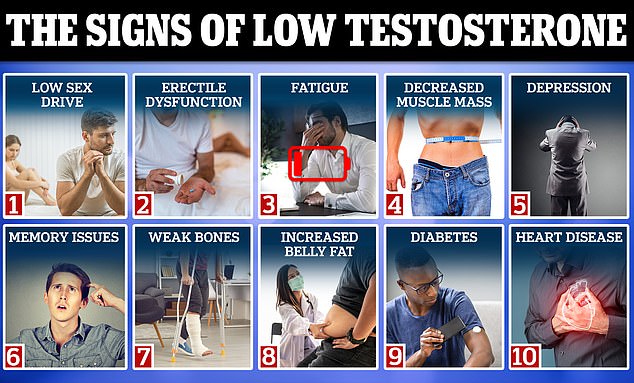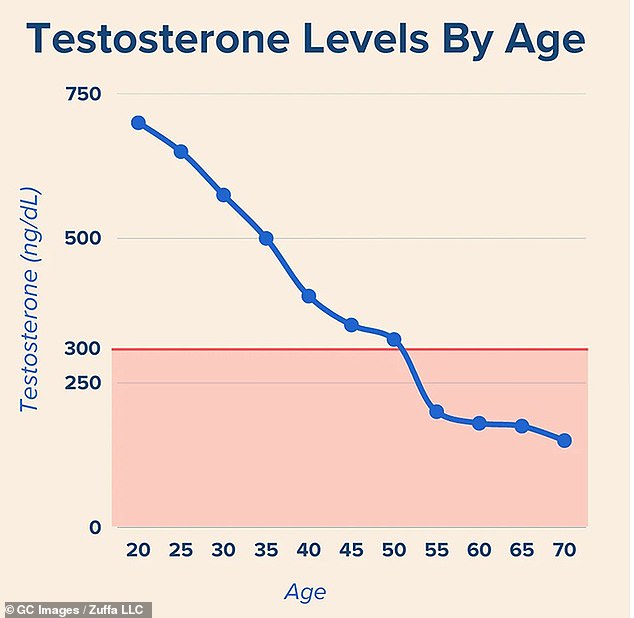
American men suddenly have a devastatingly low sperm count. Now experts know why
Robert F Kennedy Jr has issued a dire warning about the state of the nation’s fertility.
In the Oval Office on Thursday, the Health and Human Services Secretary said: ‘Today, the average teenager in this country has 50 percent of the sperm count, 50 percent of the testosterone as a 65-year-old man.’
The 71-year-old continued: ‘Our girls are hitting puberty six years earlier, and that’s bad, but also our parents aren’t having children.’
Now, the Daily Mail has spoken to three experts who say Kennedy is bringing important attention to an issue they have been worried about for decades.
However, they added it did not appear his claims were completely true, and they were unaware of any data showing teenagers had testosterone levels half as high as 65-year-old men.
It wasn’t clear if the secretary was comparing sperm counts in today’s teens and seniors or sperm counts when today’s seniors were teens several decades ago.
But the experts warned studies do suggest sperm counts appear to be trending downward across the generations, which may be driven by higher obesity rates and sedentary lifestyles, as well as exposure to environmental pollutants like plastics.
On girls entering puberty earlier, they also said that while they were not aware of evidence that showed it was happening six years earlier, studies do show that the age for a first period is also trending to earlier in life.
Robert F Kennedy Junior, the Health and Human Services Secretary, is pictured above with Donald Trump at the press conference yesterday
Dr Stephen Lazarou, a reproductive endocrinologist at Boston IVF, told the Daily Mail: ‘I think there is a general sense that testosterone levels may, indeed, be declining across the [male] generations.
‘There is some evidence, or some speculation, that there may be contributing environmental or lifestyle factors, and we believe that that might be secondary to more sedentary lifestyles or increasing obesity rates.’
Dr David Shusterman, a urologist who runs a men’s fertility clinic in New York City, added: ‘I have seen that testosterone levels are on the decline in my clinic, especially even for younger men, and that may be what Kennedy is trying to draw attention to.
‘In some cases, these men appear otherwise normal, you know, they are not overweight or have other factors that would put them at higher risk.’
RFK Jr made the comments at a press conference hosted by President Donald Trump Thursday but had also made the same claims in April, telling Fox News that a teenager today has less testosterone than a 68-year-old man and a sperm count that is ‘down 50 percent.’
A spokesperson for the Department of Health and Human Services said: ‘Secretary Kennedy is sounding the alarm on a public health issue others are too timid, or too politically cautious, to confront.
‘A growing body of peer-reviewed research shows significant declines in sperm counts over the past decades, and pretending this isn’t a serious trend is irresponsible.’
They pointed to two studies from 2017 and 2022, which both warned that sperm counts had dipped 52 percent among men from 1973 to 2011.
Testosterone is the male sex hormone and is behind secondary male characteristics such as a deeper voice and facial hair.
It peaks in men in the early 20s before gradually declining by about one to two percent per year, which researchers say is a natural part of aging.

Experts told the Daily Mail that symptoms of low testosterone include low sex drive, fatigue, decreased muscle mass, depression, and weak bones, among others
It is also linked to sperm counts, with normal levels signaling for sperm production while lower levels can lead the body to produce less sperm.
High testosterone levels, as a result of supplements or testosterone injections, can also slash sperm counts, however, by interfering with the other hormonal signals needed for sperm production.
In a 2017 study published in the journal Human Reproduction Update, and indicated by HHS, scientists surveyed sperm counts from 185 studies involving nearly 43,000 men conducted between 1973 and 2011.
They found that sperm counts had declined 52 percent over this period in North America, Europe, Australia and New Zealand.
In 2022, the same researcher, environmental medicine expert Dr Shanna Swan at Mount Sinai in New York, published a second follow-up analysis, also cited by HHS, with Dr Swan telling The Guardian her work suggested that the median sperm count could reach zero by 2045.
Some experts have raised concerns over the paper, saying it compared semen samples where different methods were used to count sperm, which may make the results unreliable.
But another paper from January 2025 similarly found that, after surveying samples from 11,700 men from between 1970 and 2018, there had been a ‘modest decline’ in sperm counts, although researchers added it would not affect fertility.
Many experts have been raising the alarm over declining fertility in men for decades, with the cause being unclear, although it has previously been linked to environmental toxins affecting the testicles, as well as poor diets and exercise.
Experts say a healthy man has a testosterone level between 300 and 1,000 nanograms per deciliter (ng/dL), with a man with levels below this considered to have low testosterone.
It is not clear how many men have low testosterone, although symptoms of the condition include erectile dysfunction, loss of muscle mass, increased body fat and mood changes such as irritability or depression.

Testosterone levels peak in young adulthood, around age 20, but decline by about 1 percent annually after age 30. This data is from a University of Wisconsin study
Studies have also found evidence that young girls are now starting puberty earlier than ever before, but not the six years earlier that RFK Jr claims.
One paper published in JAMA in May last year found that while women born between 1950 and 1969 started their periods at 12.5 years old on average, for those born between 2000 and 2005, the average age was 11.9 years old.
The researchers also found that the proportion of girls starting their puberty before the age of 11 had risen from 8.6 to 15.5 percent.
And while the proportion starting their periods before the age of nine was still small, it had more than doubled during the same time frame from 0.6 to 1.4 percent.
Researchers have said childhood obesity could be behind the shift, as well as diet, psychological stress and environmental factors such as toxins that disrupt hormones.
But it has alarmed officials, who say the change could be behind a higher risk of heart disease, cancer, miscarriages and even premature death.
Not all the experts agreed with RFK Jr, however, with Dr Jeff Singer, a senior fellow at the Cato Institute in the Department of Health Policy Studies, telling this website: ‘What I CAN say is that Secretary Kennedy has taken a couple of real studies and turned them into a sensational sound bite.
‘There’s some evidence of modest downward trends across generations, likely tied to lifestyle and health factors, but nothing close to Kennedy’s doomsday framing.
‘His claim badly distorts the data, confusing normal aging with supposed generational collapse.’
First Appeared on
Source link






